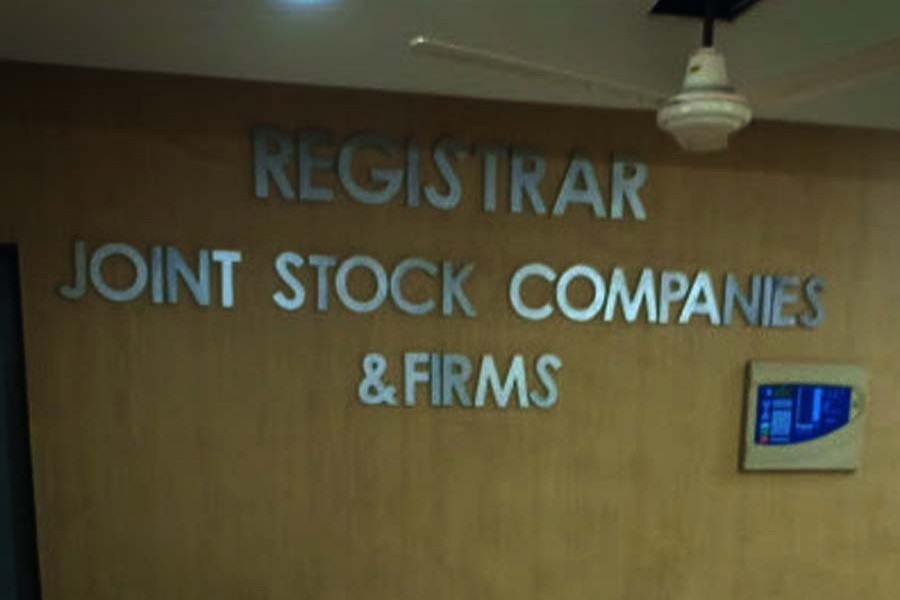The Office of the Registrar of Joint Stock Companies and Firms, or RJSC is the government body responsible for registering new companies; it is also the authority for renewal of licences for existing companies. According to a report published in this newspaper on January 24, "some 192,682 or 79.35 per cent of companies never submitted their returns" after registering. Indeed, it is shocking to learn that only 42,318 out of 205,000 registered companies have been submitting their returns off and on. That 4,298 companies got their registration in the first half of the current fiscal year, illustrates how easy it is to open up a company (both private and public limited) using the good offices of the RJSC.
Looking into the data available with the RJSC, it is apparent that the RJSC does not make it legally mandatory for companies to submit their returns. When companies are not bound to submit their returns, why would they bother? That means the national exchequer is losing out on God knows how many millions of billions in taxable income year in and year out. It is interesting to note that those companies that need to avail of bank loans are the ones submitting their returns with RJSC. That leaves the bulk of companies (RJSC registered) to continue to operate liberally, as they do not require bank finance.
Hence, the government continues to lose revenue. The outmoded operational activity of company registration remains in the hands of middlemen who work in cahoots with a section of officials and the exchequer remains bereft of what is owed to it.
The recent push for reforming RJSC by a ministry of commerce committee tasked with the job has come up with several recommendations. This includes upgrading services by improving the registration process and going online. Having an automated form for application submission that would be sent (using a random selection process) to an examiner within three working days where such examiner would be the last stop in the application process. An automated system would automatically detect-and-reject incomplete applications, which in itself, would curtail the paperwork for the RJSC. On the financial return submission front, it has been found that 9 out of 10 companies submit faulty statements. So, there is a provision for improvements here too. At the end of it all, what it all boils down to is to make the process seamless, automated and fast. Only when the service is fast and fair can there be a serious improvement in company registration. Thus only when the legal loopholes are addressed can the revenue body expect to fill its coffers with what is due to it.
As the country comes to grips with the economic downturn due to a myriad of domestic and international factors, it has become abundantly clear that things need to change. Any change is not only painful but is resisted tooth and nail. The authorities will undoubtedly face a lot of opposition from registered companies which would rather not submit their books of accounts and due to this they would inevitably draw hefty penalties in taxes not submitted. But then, a change is long overdue.
Recent media reports bring to light a host of changes being thought of to streamline the taxation system, not only for individuals but companies. Increasing direct taxation is something that is happening right now. That tax returns are up by nearly 7.0 per cent is perhaps not up to the mark the revenue authority had hoped for, but it is a step in the right direction. Again, there is the case of customs that has found through its investigations, evidence of billions of Taka which have been siphoned off through trade-based money laundering, which is closely associated with transfer pricing.
For decades, loopholes in the system were allowed for all sorts of financial mismanagement and transfer of money out of the country. Billions of taka were taxable but were not because these lax rules were kept there for the sole purpose of allowing individuals and institutions to avoid paying taxes. The country has reached a stage where (without corrective measures) the balance of payments will never reach equilibrium. With a dip in the country's international ranking, international financing has also taken a nosedive. Perhaps now, when all one sees is red, the changes that should have been initiated decades ago will start taking place. It should however be remembered, the simple rectification through amendment to a law has zero effect on realities on the ground. Every regulatory body must be revamped with the right mix of professionals, with powers to enforce rules and introduction of the right technology. It is also time to end the professional rivalries that the various departments in the government are heir to. They are not fiefdoms, but an integral part of the government machinery that is supposed to be working towards revenue generation for the national exchequer. One can only hope that the rectifications that have been the subject matter of endless debates are now introduced and acted upon.


